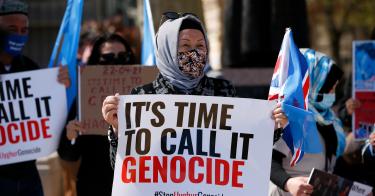In March 2019, the Chinese Communist Party (CCP) sentenced Dr. Gulshan Abbas to 20 years in prison. Beijing says Abbas, a Uighur, was guilty of “disrupting social order” by joining and helping a so-called “terrorist” organization.
But Ziba Murat, Abbas’s daughter, believes her mother’s sentencing is payback for her family’s activism in the U.S. Both Murat and her aunt, Rushan Abbas, are highly visible Uighur-American activists who have publicly denounced Beijing’s human rights violations against the Uighurs.
“My mother is a healer who went above and beyond to fulfill her duty to society as a doctor,” says Murat. “Her colleagues, friends can attest to her character. Her current fate is a clear example of CCP’s hostage diplomacy, punishing people in retaliation against their relatives for speaking the truth.”
“Why,” Murat asks, “can’t the international community seem to recognize that the regime should be held accountable for abducting innocent civilians?”
>>> How The U.S. Should Respond To Genocide In Xinjiang
Murat is but one of many Uighur-Americans whose advocacy of basic human rights has led to the persecution of their family members in China. It has become a regular practice of the CCP to try to silence Uighur activists abroad by holding their family members in Xinjiang hostage.
Mehmet Tohti, a Uighur activist, lost contact with his mother, 37 family members, and many close relatives in late 2016 when he publicly called out the CCP’s genocide against the Uighurs.
Qelbinur Sedik, a former camp teacher, fled Xinjiang to seek asylum in the Netherlands. Shortly thereafter, she received a phone call from a Chinese policeman. She relayed to the BBC the policeman’s message: “You must bear in mind that all your family and relatives are with us. You must think very carefully about that fact.”
Since former Uighur camp detainees and their relatives have publicly come forward with heart-breaking stories of Beijing’s genocidal campaign against the Uighurs, the Chinese government has launched public smear campaigns against these truth-tellers, sometimes even pitting family members against each other. The Uighur Human Rights Project reports that China produced 22 videos in which camp detainees are forced to read scripted statements to discredit their whistle-blowing relatives.
Threats, harassment, and character assassinations are all classic plays out of the CCP’s playbook. Their policy is to retaliate against anyone they believe is undermining the Party’s control.
In 2018, the CCP kidnapped the wife of Chen Xiaoping, a US-based journalist for the Chinese-language Mirror Media Group, after he exposed corruption among China’s ruling class.
Chen Guangcheng, a renowned Chinese lawyer, escaped house arrest in China (despite being legally blind) in April 2012 to seek safe haven in the U.S. But Beijing continues its efforts to intimidate him—including with death threats—to keep him from speaking out against China’s one-child policy.
Similarly, Bob Fu, a Chinese-American advocate for the persecuted church in China and the founder of ChinaAid, has faced death threats due to his critical work in safeguarding religious freedom and human rights from the abuses of the CCP.
And let’s not forget Michael Spavor and Michael Kovrig, two Canadians who have been detained in China for the last two years for their outspokenness on human rights.
Thankfully, the CCP’s attempts to silence those who criticize the regime’s abuses have not succeeded. Indeed, in many cases the persecution has had the opposite effect, emboldening the intended victims to speak out even further—even if it risks imperiling family members back home in China. They know that the consequences of silence are far graver.
>>> The United States Should Give Fleeing Uighurs a Home
The CCP’s abuse of basic human rights has forced many to seek safety beyond their borders. The U.S. should do what it can to extend safe haven to particularly vulnerable groups. This would include extending Priority-2 refugee status to Uighurs and Hong Kongers who face unprecedented persecution.
Once the refugees arrive here, the U.S. should do what it can to ensure that the CCP does not extra-territorially infringe on their rights and freedoms. Beyond this, the U.S. should continue to press for the release of all political prisoners in China, including the 1.8 million to 3 million Uighurs currently held in political reeducation camps.
As currently detained Hong Kong entrepreneur and activist Jimmy Lai once said, the CCP is inducing fear to inexpensively and pervasively silence dissent. The U.S. should ensure that the voices of those who are suffering in China are heard and that they are met with a reply: You can find safety here, and if you can’t come here, we will be a voice for you in your time of need.
This piece originally appeared in Providence Mag



